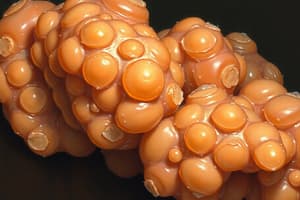Podcast
Questions and Answers
Which substance is synthesized by microbes but not by plants or animals?
Which substance is synthesized by microbes but not by plants or animals?
- Acetyl-CoA
- Malonyl-CoA
- Hydroxocobalamin
- Cobalamine (Vitamin B12) (correct)
What effect does high glucose levels have on fatty acid oxidation?
What effect does high glucose levels have on fatty acid oxidation?
- Stimulates the synthesis of malonyl-CoA (correct)
- Increases the degradation of fatty acids in mitochondria
- Inhibits beta-oxidation by increasing fatty acid transport
- Stimulates the inhibition of malonyl-CoA production
What are the three main ketone bodies produced from acetyl-CoA?
What are the three main ketone bodies produced from acetyl-CoA?
- Acetoacetate, acetone, and β-hydroxybutyrate (correct)
- Acetyl-CoA, malonyl-CoA, propionyl-CoA
- Acetic acid, hydroxymethylbutyric acid, isobutyric acid
- Butyric acid, stearic acid, and palmitic acid
What role does malonyl-CoA play in fatty acid metabolism?
What role does malonyl-CoA play in fatty acid metabolism?
What condition arises from the accumulation of ketone bodies?
What condition arises from the accumulation of ketone bodies?
Which enzyme is needed to convert the cis double bond between C-3 and C-4 into a suitable substrate for beta-oxidation?
Which enzyme is needed to convert the cis double bond between C-3 and C-4 into a suitable substrate for beta-oxidation?
What is the impact of using a reductase on total energy output during the oxidation of unsaturated fatty acids?
What is the impact of using a reductase on total energy output during the oxidation of unsaturated fatty acids?
After normal β-oxidation of odd-number fatty acids, what C3 fragment is produced?
After normal β-oxidation of odd-number fatty acids, what C3 fragment is produced?
Which of the following statements accurately describes the oxidation of polyunsaturated fatty acids?
Which of the following statements accurately describes the oxidation of polyunsaturated fatty acids?
What occurs to the C3 fragment produced from odd-number fatty acid oxidation?
What occurs to the C3 fragment produced from odd-number fatty acid oxidation?
In the context of mono/polyunsaturated fatty acid oxidation, what is the primary function of coenzyme B12?
In the context of mono/polyunsaturated fatty acid oxidation, what is the primary function of coenzyme B12?
What is typically produced at the end of β-oxidation of even-numbered fatty acids?
What is typically produced at the end of β-oxidation of even-numbered fatty acids?
How does the energy output from the oxidation of polyunsaturated fatty acids compare with that from saturated fatty acids?
How does the energy output from the oxidation of polyunsaturated fatty acids compare with that from saturated fatty acids?
Which enzyme is primarily responsible for the activation of fatty acids before they undergo oxidation?
Which enzyme is primarily responsible for the activation of fatty acids before they undergo oxidation?
What are ketone bodies primarily synthesized from during periods of fasting or carbohydrate depletion?
What are ketone bodies primarily synthesized from during periods of fasting or carbohydrate depletion?
Which of the following hormones is known to enhance fatty acid mobilization from adipose tissue?
Which of the following hormones is known to enhance fatty acid mobilization from adipose tissue?
How do the energy yields from fatty acid oxidation compare to those from the oxidation of sugars of the same carbon backbone size?
How do the energy yields from fatty acid oxidation compare to those from the oxidation of sugars of the same carbon backbone size?
Which molecule serves as the primary transport form of cholesterol in the bloodstream?
Which molecule serves as the primary transport form of cholesterol in the bloodstream?
What happens to oxaloacetate (OAA) levels during starvation?
What happens to oxaloacetate (OAA) levels during starvation?
What is the primary reason ketone bodies are produced during starvation?
What is the primary reason ketone bodies are produced during starvation?
What ultimately determines whether acetyl-CoA enters the TCA cycle or is converted to ketone bodies?
What ultimately determines whether acetyl-CoA enters the TCA cycle or is converted to ketone bodies?
What condition occurs as a result of untreated diabetes mellitus?
What condition occurs as a result of untreated diabetes mellitus?
Which statement about ketone bodies is correct?
Which statement about ketone bodies is correct?
In diabetic ketoacidosis, which hormone is typically low?
In diabetic ketoacidosis, which hormone is typically low?
How does the body primarily use ketone bodies during starvation?
How does the body primarily use ketone bodies during starvation?
What role does glucagon play in fatty acid metabolism during fasting?
What role does glucagon play in fatty acid metabolism during fasting?
What is the primary reason that fats are easy to store in cells?
What is the primary reason that fats are easy to store in cells?
Which type of lipoprotein is primarily composed of triacylglycerols?
Which type of lipoprotein is primarily composed of triacylglycerols?
What stimulates the mobilization of triacylglycerols from adipose tissue?
What stimulates the mobilization of triacylglycerols from adipose tissue?
What is the primary role of carnitine in fatty acid metabolism?
What is the primary role of carnitine in fatty acid metabolism?
How many rounds of β-oxidation occur for palmitic acid (C16) to generate acetyl CoA?
How many rounds of β-oxidation occur for palmitic acid (C16) to generate acetyl CoA?
What is the net ATP yield from the complete oxidation of hexanoic acid (C6)?
What is the net ATP yield from the complete oxidation of hexanoic acid (C6)?
In the process of β-oxidation, which compounds are formed from fatty acids?
In the process of β-oxidation, which compounds are formed from fatty acids?
What is the role of hormone-sensitive lipase (HSL) in fat metabolism?
What is the role of hormone-sensitive lipase (HSL) in fat metabolism?
What happens to glycerol during fat metabolism?
What happens to glycerol during fat metabolism?
Which enzyme is primarily responsible for the conjugation of fatty acids with CoA before oxidation?
Which enzyme is primarily responsible for the conjugation of fatty acids with CoA before oxidation?
What is the primary source of energy for hibernating animals?
What is the primary source of energy for hibernating animals?
Which sequential process takes place in the mitochondria following β-oxidation?
Which sequential process takes place in the mitochondria following β-oxidation?
Which type of lipoprotein is involved in transporting cholesterol from peripheral tissues to the liver?
Which type of lipoprotein is involved in transporting cholesterol from peripheral tissues to the liver?
How many ATP are generated from one round of β-oxidation?
How many ATP are generated from one round of β-oxidation?
Flashcards
Fatty Acid Oxidation
Fatty Acid Oxidation
The process of breaking down fatty acids into acetyl-CoA molecules to generate energy.
Unsaturated Fatty Acids
Unsaturated Fatty Acids
Fatty acids with one or more double bonds in their hydrocarbon chains.
β-oxidation
β-oxidation
A metabolic pathway that progressively removes two-carbon units from the fatty acid chain as acetyl-CoA.
Cis conformation
Cis conformation
Signup and view all the flashcards
Isomerase
Isomerase
Signup and view all the flashcards
Reductase
Reductase
Signup and view all the flashcards
Odd-number fatty acids
Odd-number fatty acids
Signup and view all the flashcards
Propionyl-CoA
Propionyl-CoA
Signup and view all the flashcards
Succinyl-CoA
Succinyl-CoA
Signup and view all the flashcards
Coenzyme B12
Coenzyme B12
Signup and view all the flashcards
Fatty Acid Catabolism
Fatty Acid Catabolism
Signup and view all the flashcards
Fats
Fats
Signup and view all the flashcards
Energy Source for Animals
Energy Source for Animals
Signup and view all the flashcards
Chylomicrons
Chylomicrons
Signup and view all the flashcards
Adipocytes
Adipocytes
Signup and view all the flashcards
Epinephrine
Epinephrine
Signup and view all the flashcards
Hormone-sensitive Lipase (HSL)
Hormone-sensitive Lipase (HSL)
Signup and view all the flashcards
Fatty Acid Activation
Fatty Acid Activation
Signup and view all the flashcards
β-Oxidation
β-Oxidation
Signup and view all the flashcards
Carnitine
Carnitine
Signup and view all the flashcards
Mitochondrial Matrix
Mitochondrial Matrix
Signup and view all the flashcards
Glycerol Metabolism
Glycerol Metabolism
Signup and view all the flashcards
Acetyl CoA
Acetyl CoA
Signup and view all the flashcards
Succinyl-CoA Synthesis
Succinyl-CoA Synthesis
Signup and view all the flashcards
Methylmalonyl-CoA mutase
Methylmalonyl-CoA mutase
Signup and view all the flashcards
Cobalamine (Vit B12)
Cobalamine (Vit B12)
Signup and view all the flashcards
Hydroxocobalamin
Hydroxocobalamin
Signup and view all the flashcards
Fatty Acid Oxidation Regulation
Fatty Acid Oxidation Regulation
Signup and view all the flashcards
Malonyl-CoA
Malonyl-CoA
Signup and view all the flashcards
Ketone Bodies
Ketone Bodies
Signup and view all the flashcards
Ketoacidosis
Ketoacidosis
Signup and view all the flashcards
Acetoacetate
Acetoacetate
Signup and view all the flashcards
Acetone
Acetone
Signup and view all the flashcards
β-hydroxybutyrate
β-hydroxybutyrate
Signup and view all the flashcards
Fatty Acid Synthesis
Fatty Acid Synthesis
Signup and view all the flashcards
Ketone bodies
Ketone bodies
Signup and view all the flashcards
Ketone body formation (liver)
Ketone body formation (liver)
Signup and view all the flashcards
Diabetic Ketoacidosis
Diabetic Ketoacidosis
Signup and view all the flashcards
Oxaloacetate (OAA) role in metabolism
Oxaloacetate (OAA) role in metabolism
Signup and view all the flashcards
Why ketone bodies are important during starvation
Why ketone bodies are important during starvation
Signup and view all the flashcards
Role of Insulin in glucose metabolism
Role of Insulin in glucose metabolism
Signup and view all the flashcards
Chylomicrons
Chylomicrons
Signup and view all the flashcards
Fats as fuel storage
Fats as fuel storage
Signup and view all the flashcards
Fatty acid mobilization
Fatty acid mobilization
Signup and view all the flashcards
Glycerol metabolism
Glycerol metabolism
Signup and view all the flashcards
Fatty acid activation
Fatty acid activation
Signup and view all the flashcards
Fatty acid transport
Fatty acid transport
Signup and view all the flashcards
Fatty acid oxidation
Fatty acid oxidation
Signup and view all the flashcards
Ketone body synthesis
Ketone body synthesis
Signup and view all the flashcards
Ketone bodies
Ketone bodies
Signup and view all the flashcards
Energetic balance
Energetic balance
Signup and view all the flashcards
Fatty acid oxidation regulation
Fatty acid oxidation regulation
Signup and view all the flashcards
Diabetes
Diabetes
Signup and view all the flashcards
Diabetic ketoacidosis
Diabetic ketoacidosis
Signup and view all the flashcards
Epinephrine
Epinephrine
Signup and view all the flashcards
Chylomicrons, VLDL, LDL, HDL
Chylomicrons, VLDL, LDL, HDL
Signup and view all the flashcards
Study Notes
Fatty Acid Catabolism
- Fats are esters of glycerol with fatty acids.
- Highly reduced structures, similar to hydrocarbons, have high energy per gram.
- In the liver and heart, fats provide approximately 80% of the total energy consumed.
- Fats are hydrophobic and inert, segregating from water.
- They are easy to store as lipid droplets without raising the osmolarity of the cell.
- Fats can be stored in large amounts in cells without risk of undesired chemical reactions.
- Fats are the sole energy source for hibernating animals and migratory birds.
Digestion, Mobilization, and Transport of Fats
- Bile salts emulsify dietary fats in the small intestine, forming mixed micelles.
- Intestinal lipases degrade triacylglycerols.
- Fatty acids and other breakdown products are absorbed by the intestinal mucosa and converted into triacylglycerols.
- Triacylglycerols are incorporated with cholesterol and apolipoproteins into chylomicrons.
- Chylomicrons move through the lymphatic system and bloodstream to tissues.
- Lipoprotein lipase converts triacylglycerols to fatty acids and glycerol in capillaries.
- Fatty acids enter cells.
Structure of Chylomicrons
- Size: 100-500 nm.
- Composition: triacylglycerols (80%), phospholipids, cholesterol, and cholesterol esters, apolipoproteins (lipid-binding proteins).
- Various combinations of lipids and proteins (e.g., chylomicrons, VLDL, VHDL) are distinguished.
- Protein moieties of lipoproteins are recognized by receptors on cell surfaces.
Mobilization of Triacylglycerols Stored in Adipose Tissue
- Binding of epinephrine to receptors on adipocytes stimulates adenylyl cyclase.
- cAMP produced activates protein kinase A (PKA).
- PKA phosphorylates perilipin on the surface of lipid droplets, making fats accessible to hormone-sensitive lipase (HSL).
- HSL hydrolyzes triglycerides into fatty acids and glycerol.
- Fatty acids leave adipocytes and are transported by serum proteins (e.g., albumin) to muscles for energy generation.
Metabolism of Glycerol
- Glycerol accounts for approximately 5% of the total energy of fats.
- Energy is harvested through conversion into glyceraldehyde 3-phosphate, then via the glycolytic pathway.
- All phosphorylated species are negatively charged and trapped into the cytoplasm.
Fatty Acid "Activation" Prior to Oxidation
- Enzymes for fatty acid oxidation are located in the mitochondrial matrix.
- Fatty acids must be conjugated with CoA in the cytoplasm before transport to mitochondria.
- Conjugation is highly exergonic due to pyrophosphate release, further hydrolyzed to two phosphates.
Fatty Acid Transport into Mitochondria
- Carnitine acts as a fatty acid shuttle between the cytosol and the interior of mitochondria.
- Fatty acid is converted to a carnitine ester to be transported into mitochondria.
Oxidation of Fatty Acids
- In humans, β-oxidation primarily occurs in mitochondria.
- It comprises three stages:
- Sequential β-oxidation rounds to generate acetyl-CoA.
- Oxidation of acetyl-CoA to CO2, FADH2, and NADH using the citric acid cycle.
- Transfer of electrons from FADH2 and NADH to O2, with ATP generation.
Stage 1: β-Oxidation of Saturated Fatty Acids
- Acyl-CoA dehydrogenase removes hydrogens to produce FADH2.
- Enoyl-CoA hydratase adds water, creating a hydroxyl group.
- β-hydroxyacyl-CoA dehydrogenase oxidizes the hydroxyl group, forming a ketone.
- β-ketoacyl-CoA thiolase cleaves off an acetyl group, repeating the cycle.
- This cycle continues until the entire fatty acid is oxidized into acetyl-CoA's.
Oxidation of Odd-Number Fatty Acids
- Odd-number fatty acids yield propionyl-CoA at the end of β-oxidation.
- Propionyl-CoA must be converted to succinyl-CoA, an intermediate in the citric acid cycle, before entering the TCA cycle.
- B12 is used for isomerization of methylmalonyl-CoA to succinyl-CoA
Monounsaturated Fatty Acid Oxidation
- Requires an additional isomerase enzyme to convert the cis bond to a trans bond.
- An additional reductase is needed as well.
Polyunsaturated Fatty Acid Oxidation
- Contains two or more double bonds.
- Requires additional enzymes (isomerase, reductase).
- Less energy is produced compared to saturated fatty acids due to the need for additional enzymes.
Mono/polyunsaturated Fatty Acid Oxidation: Summary
- Most naturally occurring unsaturated fatty acids have a cis conformation.
- This causes issues with β-oxidation due to the need for additional enzymes.
Regulation of Fatty Acid Oxidation
- High glucose levels stimulate the synthesis of malonyl-CoA.
- Malonyl-CoA inhibits the transport of fatty acids into mitochondria, thus regulating fatty acid oxidation.
Ketone Bodies - Alternative Fuel to Sugars
- Acetyl-CoA produced from fatty acid oxidation can be converted into ketone bodies.
- Acetoacetate, acetone, and β-hydroxybutyrate are ketone bodies.
- Ketone bodies can be used as fuel by other tissues when glucose is unavailable.
Ketone Bodies Formation and Export from the Liver
- Starvation and untreated diabetes lead to overproduction of ketone bodies.
- Hepatocytes synthesize ketone bodies from acetyl-CoA.
- Ketone bodies are exported to peripheral tissues for use.
Drugs and Diseases
- Diseases and conditions related to fatty acid metabolism, such as diabetes and diabetic ketoacidosis are discussed.
- Drugs and vitamins related to these conditions, like epinephrine, B12, and hydroxocobalamin.
- Metabolites and blood components that are analyzed in connection to these imbalances.
Studying That Suits You
Use AI to generate personalized quizzes and flashcards to suit your learning preferences.




